- Home
- Joseph Conrad
The Brute Page 2
The Brute Read online
Page 2
I acknowledged this interesting communication by a sympathetic murmur. He waved his hand carelessly.
"This might have utterly spoiled a chap's nerve for going aloft, you know— utterly. He fell within two feet of me, cracking his head on a mooring-bitt. Never moved. Stone dead. Nice looking little fellow, he was. I had just been thinking we would be great chums. However, that wasn't yet the worst that brute of a ship could do. I served in her three years of my time, and then I got transferred to the Lucy Apse, for a year. The sailmaker we had in the Apse Family turned up there, too, and I remember him saying to me one evening, after we had been a week at sea: 'Isn't she a meek little ship?' No wonder we thought the Lucy Apse a dear, meek, little ship after getting clear of that big rampaging savage brute. It was like heaven. Her officers seemed to me the restfullest lot of men on earth. To me who had known no ship but the Apse Family, the Lucy was like a sort of magic craft that did what you wanted her to do of her own accord. One evening we got caught aback pretty sharply from right ahead. In about ten minutes we had her full again, sheets aft, tacks down, decks cleared, and the officer of the watch leaning against the weather rail peacefully. It seemed simply marvellous to me. The other would have stuck for half-an-hour in irons, rolling her decks full of water, knocking the men about—spars cracking, braces snapping, yards taking charge, and a confounded scare going on after because of her beastly rudder, which she had a way of flapping about fit to raise your hair on end. I couldn't get over my wonder for days.
"Well, I finished my last year of apprenticeship in that jolly little ship—she wasn't so little either, but after that other heavy devil she seemed but a plaything to handle. I finished my time and passed; and then just as I was thinking of having three weeks of real good time on shore I got at breakfast a letter asking me the earliest day I could be ready to join the Apse Family as third mate. I gave my plate a shove that shot it into the middle of the table; dad looked up over his paper; mother raised her hands in astonishment, and I went out bareheaded into our bit of garden, where I walked round and round for an hour.
"When I came in again mother was out of the dining-room, and dad had shifted berth into his big armchair. The letter was lying on the mantelpiece.
" 'It's very creditable to you to get the offer, and very kind of them to make it,' he said. 'And I see also that Charles has been appointed chief mate of that ship for one voyage.'
"There was overleaf a PS. to that effect in Mr. Apse's own handwriting, which I had overlooked. Charley was my big brother.
" 'I don't like very much to have two of my boys together in one ship,' father goes on, in his deliberate solemn way. 'And I may tell you that I would not mind writing Mr. Apse a letter to that effect.'
"Dear old dad! He was a wonderful father. What would you have done? The mere notion of going back (and as an officer, too), to be worried and bothered, and kept on the jump night and day by that brute, made me feel sick. But she wasn't a ship you could afford to fight shy of.
Besides, the most genuine excuse could not be given without mortally offending Apse Sons.
The firm, and I believe the whole family down to the old unmarried aunts in Lancashire, had grown desperately touchy about that accursed ship's character. This was the case for answering 'Ready now' from your very death-bed if you wished to die in their good grace. And that's precisely what I did answer—by wire, to have it over and done with at once.
"The prospect of being shipmates with my big brother cheered me up considerably, though it made me a bit anxious, too. Ever since I remember myself as a little chap he had been very good to me, and I looked upon him as the finest fellow in the world. And so he was. No better officer ever walked the deck of a merchant ship. And that's a fact. He was a fine, strong, upstanding, sun-tanned young fellow, with his brown hair curling a little, and an eye like a hawk. He was just splendid. We hadn't seen each other for many years, and even this time, though he had been in England three weeks already, he hadn't showed up at home yet, but had spent his spare time in Surrey somewhere making up to Colchester, old Captain Colchester's niece. Her father, a great friend Maggie dad's, was in the sugar-broking business, and Charley made a sort of second home of their house. I wondered what my big brother would think of me. There was a sort of sternness about Charley's face which never left it, not even when he was larking in his rather wild fashion.
"He received me with a great shout of laughter. He seemed to think my joining as an officer the greatest joke in the world. There was a difference of ten years between us, and I suppose he remembered me best in pinafores. I was a kid of four when he first went to sea. It surprised me to find how boisterous he could be.
" 'Now we shall see what you are made of,' he cried. And he held me off by the shoulders, and punched my ribs, and hustled me into his berth. 'Sit down, Ned. I am glad of the chance of having you with me. I'll put the finishing touch to you, my young officer, providing you're worth the trouble. And, first of all, get it well into your head that we are not going to let this brute kill anybody this voyage. We'll stop her racket.'
"I perceived he was in dead earnest about it. He talked grimly of the ship, and how we must be careful and never allow this ugly beast to catch us napping with any of her damned tricks.
"He gave me a regular lecture on special seamanship for the use of the Apse Family; then changing his tone, he began to talk at large, raffling off the wildest, funniest nonsense, till my sides ached with laughing. I could see very well he was a bit above himself with high spirits. It couldn't be because of my coming. Not to that extent. But, of course, I wouldn't have dreamt of asking what was the matter. I had a proper respect for my big brother, I can tell you. But it was all made plain enough a day or two afterwards, when I heard that Miss Maggie Colchester was coming for the voyage. Uncle was giving her a sea-trip for the benefit of her health.
"I don't know what could have been wrong with her health. She had a beautiful colour, and a deuce of a lot of fair hair. She didn't care a rap for wind, or rain, or spray, or sun, or green seas, or anything. She was a blue-eyed, jolly girl of the very best sort, but the way she checked my big brother used to frighten me. I always expected it to end in an awful row. However, nothing decisive happened till after we had been in Sydney for a week. One day, in the men's dinner hour, Charley sticks his head into my cabin. I was stretched out on my back on the settee, smoking in peace.
" 'Come ashore with me, Ned,' he says, in his curt way.
"I jumped up, of course, and away after him down the gangway and up George Street. He strode along like a giant, and I at his elbow, panting. It was confoundedly hot. 'Where on earth are you rushing me to, Charley?' I made bold to ask.
" 'Here,' he says.
" 'Here' was a jeweller's shop. I couldn't imagine what he could want there. It seemed a sort of mad freak. He thrusts under my nose three rings, which looked very tiny on his big, brown palm, growling out—
" 'For Maggie! Which!'."I got a kind of scare at this. I couldn't make a sound, but I pointed at the one that sparkled white and blue. He put it in his waistcoat pocket, paid for it with a lot of sovereigns, and bolted out. When we got on board I was quite out of breath. 'Shake hands, old chap,' I gasped out. He gave me a thump on the back. 'Give what orders you like to the boatswain when the hands turn-to, ' says he; 'I am off duty this afternoon.'
"Then he vanished from the deck for a while, but presently he came out of the cabin with Maggie, and these two went over the gangway publicly, before all hands, going for a walk together on that awful, blazing, hot day, with clouds of dust flying about. They came back after a few hours looking very staid, but didn't seem to have the slightest idea where they had been.
Anyway that's the answer they both made to Mrs. Colchester's question at tea-time.
"And didn't she turn on Charley, with her voice like an old night cabman's. 'Rubbish. Don't know where you've been! Stuff and nonsense. You've walked the girl off her legs. Don't do it again.'
"It's surprisin
g how meek Charley could be with that old woman. Only on one occasion he whispered to me, 'I'm jolly glad she isn't Maggie's aunt, except by marriage. That's no sort of relationship.' But I think he let Maggie have too much of her own way. She was hopping all over that ship in her yachting skirt and a red tam-o'-shanter like a bright bird on a dead black tree. The old salts used to grin to themselves when they saw her coming along, and offered to teach her knots or splices. I believe she liked the men, for Chancy's sake, I suppose.
"As you may imagine, the diabolic propensities of that cursed ship were never spoken of on board. Not in the cabin, at any rate. Only once on the homeward passage Charley said, incautiously, something about bringing all her crew home this time. Captain Colchester began to look uncomfortable at once, and that silly, hard-bitten old woman flew out at Chancy as though he had said something indecent. I was quite confounded myself; as to Maggie, she sat completely mystified, opening her blue eyes very wide. Of course, before she was a day older she wormed it all out of me. She was a very difficult person to lie to.
" 'How awful,' she said, quite solemn. 'So many poor fellows. I am glad the voyage is nearly over. I won't have a moment's peace about Charley now.'
"I assured her Charley was all right. It took more than that ship knew to get over a seaman like Charley. And she agreed with me.
"Next day we got the tug off Dungeness; and when the tow-rope was fast Charley rubbed his hands and said to me in an undertone- " 'We've baffled her, Ned.'
" 'Looks like it,' I said, with a grin at him. It was beautiful weather, and the sea as smooth as a millpond. We went up the river without a shadow of trouble except once, when off Hole Haven, the brute took a sudden sheer and nearly had a barge anchored just clean of the fairway. But I was aft, looking after the steering, and she did not catch me napping that time. Charley came up on the poop, looking very concerned. 'Close shave,' says he.
" 'Never mind, Charley,' I answered, cheerily. 'You've tamed her.'
"We were to tow right up to the dock. The river pilot boarded us below and the first words I heard him say were: 'You may just as well take Gravesend, your port anchor inboard at once, Mr. Mate.'
"This had been done when I went forward. I saw Maggie on the forecastle head enjoying the bustle, and I begged her to go aft, but she took no notice of me, of course. Then Charley, who was very busy with the head gear, caught sight of her and shouted in his biggest voice: 'Get off the forecastle head, Maggie. You're in the way here.' For all answer she made a funny face at him, and I saw poor Chancy turn away, hiding a smile. She was flushed with the excitement of getting home again, and her blue eyes seemed to snap electric sparks as she looked at the river. A collier brig had gone round just ahead of us, and our tug had to stop her engines in a hurry to avoid running into her.
"In a moment, as is usually the case, all the shipping in the reach seemed to get into a hopeless tangle. A schooner and a ketch got up a small collision all to themselves right in the middle of the river. It was exciting to watch, and, meantime, our tug remained stopped. Any other ship than that brute could have been coaxed to keep straight for a couple of minutes—but not she! Her head fell off at once, and she began to drift down, taking her tug along with her. I noticed a cluster of coasters at anchor within a quarter of a mile of us, and I thought I had better speak to the pilot. 'If you let her get amongst that lot,' I said quietly, 'she will grind some of them to bits before we get her out again.'
" 'Don't I know her!' cries he, stamping his foot in a perfect fury. And he out with his whistle to make that bothered tug get the ship's head up again as quick as possible. He blew like mad, waving his arm to port, and presently we could see that the tug's engines had been set going ahead. Her paddles churned the water, but it was as if she had been trying to tow a rock—she couldn't get an inch out of that ship. Again the pilot blew his whistle, and waved his arms to port. We could see the tug's paddles turning faster and faster away, broad on our bow.
"For a moment tug and ship hung motionless in a crowd of moving shipping, and then the terrific strain that evil, stony-hearted brute would always put on everything, tore the towing-chock clean out. The tow-rope surged over, snapping the iron stanchions of the head-rail one after another as if they had been sticks of sealing-wax. It was only then I noticed that in order to have a better view over our heads, Maggie had stepped upon the port anchor as it lay flat on the forecastle deck.
"It had been lowered properly into its hardwood beds, but there had been no time to take a turn with it. Anyway, it was quite secure as it was, for going into dock, but I could see directly that the tow-rope would sweep under the fluke in another second. My heart flew up right into my throat, but not before I had time to yell out: 'Jump clear of that anchor!'
"But I hadn't time to shriek out her name. I don't suppose she heard me at all. The first touch of the hawser against the fluke threw her down; she was up on her feet again as quick as lightning, but she was up on the wrong side. I heard a horrid, scraping sound, and then that anchor, tipping over, nose up like something alive; its great, rough iron arm caught Maggie round the waist, seemed to clasp her close with a dreadful hug, and flung itself with her over and down in a terrific clang of iron, followed by heavy ringing blows that shook the ship from stern to stem—because the ring stopper held!"
"How horrible!" I exclaimed.
"I used to dream for years afterwards of anchors catching hold of girls," said the man in tweeds, a little wildly. He shuddered. "With a most pitiful howl Charley was over after her almost on the instant. But, Lord! he didn't see as much as a gleam of her red tam-o'-shanter in the water. Nothing! nothing whatever! In a moment there were hall-a-dozen boats around us, and he got pulled into one. I, with the boatswain and the carpenter, let go the other anchor in a hurry and brought the ship up somehow. The pilot had gone silly. He walked up and down the forecastle head wringing his hands and muttering to himself: 'Killing women, now! Killing women now!' Not another word could you get out of him.
"Dusk fell, then a night black as pitch; and peering upon the river I heard a low, mournful hail, 'Ship, ahoy!' Two Gravesend watermen came alongside. They had a lantern in their wherry, and looked up the ship's side, holding on to the ladder without a word. I saw in the patch of light a lot of loose, fair hair down there."
He shuddered again.
"After the tide turned poor Maggie's body had floated clear of one of them big mooring buoys," be explained. "I crept aft, feeling half-dead and managed to send a rocket up—to let the other searchers know, on the river. And then I slunk away forward like a cur, and spent the night sitting on the heel of the bowsprit so as to be as far as possible out of Charley's way."
"Poor fellow!" I murmured.
"Yes. Poor fellow," he repeated musingly. "That brute wouldn't let him—not even him—cheat her of her prey. But he made her fast in dock next morning. He did. We hadn't exchanged a word—not a single look for that matter. I didn't want to look at him. When the last rope was fast he put his hands to his head and stood gazing down at his feet as if trying to remember something. The men waited on the main deck for the words that end the voyage. Perhaps that is what he was trying to remember. I spoke for him. 'That'll do, men.'
"I never saw a crew leave a ship so quietly. They sneaked over the rail one after another, taking care not to bang their sea chests too heavily. They looked our way, but not one had the stomach to come up and offer to shake hands with the mate as is usual.
"I followed him all over the empty ship to and fro, here and there, with no living soul about but the two of us, because the old ship-keeper had locked himself up in the galley—both doors.
Suddenly poor Chancy mutters, in a crazy voice: 'I'm done here,' and strides down the gangway with me at his heels, up the dock, out at the gate, on towards Tower Hill. He used to take rooms with a decent old landlady in America Square, to be near his work.
"All at once he stops short, turns round, and comes back straight at me. 'Ned,' says he, 'I am going
home.' I had the good luck to sight a four-wheeler and got him in just in time. His legs were beginning to give way. In our hall he fell down a chair, and I'll never forget father's and mother's amazed, perfectly still faces as they stood over him. They couldn't understand what had happened to him till I blubbered out 'Maggie got drowned, yesterday, in the river.'
"Mother let out a little cry. Father looks from him to me, and from me to him, as if comparing our faces—for, upon my soul, Charley did not resemble himself at all. Nobody moved: and the poor fellow raises his big brown hands slowly to his throat, and with one single tug rips everything open—collar, shirt, waistcoat,—a perfect wreck and ruin of a man. Father and I got him upstairs somehow, and mother pretty nearly killed herself nursing him through a brain fever."
The man in tweeds nodded at me significantly.
"Ah! there was nothing that could be done with that brute. She had a devil in her."
"Where's your brother?" I asked, expecting to hear he was dead. But he was commanding a smart steamer on the China coast, and never came home now.
Jermyn fetched a heavy sigh, and the handkerchief being now sufficiently dry, put it up tenderly to his red and lamentable nose.
"She was a ravening beast," the man in tweeds started again. "Old Colchester put his foot down and resigned. And would you believe it? Apse Sons wrote to ask whether he wouldn't reconsider his decision! Anything to save the good name of the Apse Family! Old Colchester went to the office then and said that he would take charge again but only to sail her out into the North Sea and scuttle her there. He was nearly off his chump. He used to be darkish iron-grey, but his hair went snow-white in a fortnight. And Mr. Lucian Apse (they had known each other as young men) pretended not to notice it. Eh? Here's infatuation if you like! Here's pride for you!."They jumped at the first man they could get to take her, for fear of the scandal of the Apse Family not being able to find a skipper. He was a festive soul, I believe, but he stuck to her grim and hard. Wilmot was his second mate. A harum-scarum fellow, and pretending to a great scorn for all the girls. The fact is he was really timid. But let only one of them do as much as lift her little finger in encouragement, and there was nothing that could hold the beggar. As apprentice, once, he deserted abroad after a petticoat, and would have gone to the dogs then if his skipper hadn't taken the trouble to find him and lug him by the ears out of some house of perdition or other.

 Heart of Darkness
Heart of Darkness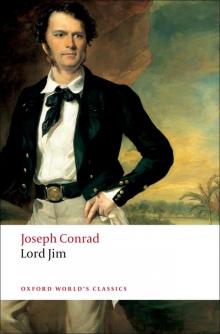 Lord Jim
Lord Jim The Nigger of the Narcissus (Echo Library)
The Nigger of the Narcissus (Echo Library) Victory (Dover Thrift Editions)
Victory (Dover Thrift Editions) Secret Agent
Secret Agent Nostromo
Nostromo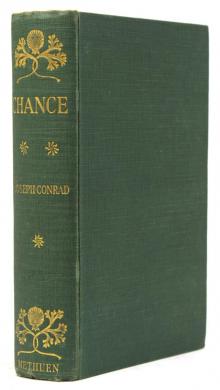 Chance: A Tale in Two Parts
Chance: A Tale in Two Parts Youth
Youth Almayer's Folly
Almayer's Folly The Heart of Darkness and the Secret Sharer
The Heart of Darkness and the Secret Sharer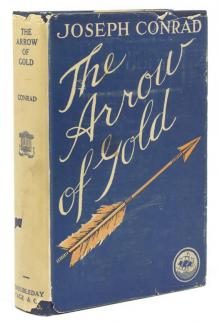 The Arrow of Gold: A Story Between Two Notes
The Arrow of Gold: A Story Between Two Notes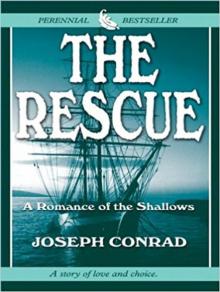 The Rescue: A Romance of the Shallows
The Rescue: A Romance of the Shallows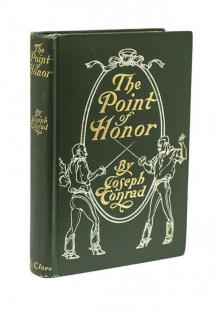 The Point Of Honor: A Military Tale
The Point Of Honor: A Military Tale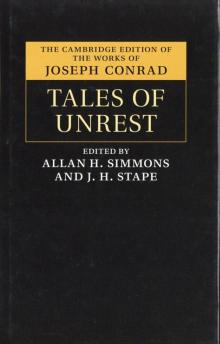 Tales of Unrest
Tales of Unrest Under Western Eyes
Under Western Eyes Gaspar Ruiz
Gaspar Ruiz A Set of Six
A Set of Six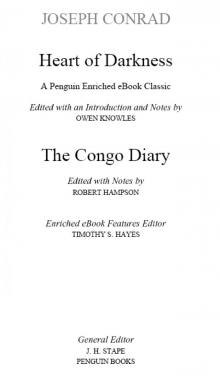 Heart of Darkness and the Congo Diary (Penguin Classics)
Heart of Darkness and the Congo Diary (Penguin Classics) Heart of Darkness and Selected Short Fiction
Heart of Darkness and Selected Short Fiction Typhoon
Typhoon Youth, a Narrative
Youth, a Narrative Tomorrow
Tomorrow The Arrow of Gold
The Arrow of Gold The Shadow Line: A Confession
The Shadow Line: A Confession The Rescue
The Rescue Victory (Echo Library)
Victory (Echo Library) The Brute
The Brute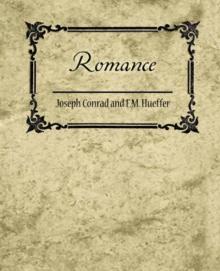 Romance
Romance A Personal Record
A Personal Record Lord Jim: A Tale
Lord Jim: A Tale Heart of Darkness and Selected Short Fiction (Barnes & Noble Classics Series)
Heart of Darkness and Selected Short Fiction (Barnes & Noble Classics Series) Within the Tides
Within the Tides The Secret Sharer and Other Stories
The Secret Sharer and Other Stories Falk
Falk Heart of Darkness and The Secret Sharer
Heart of Darkness and The Secret Sharer Chance
Chance An Anarchist
An Anarchist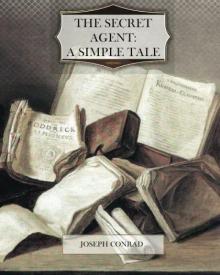 The Secret Agent: A Simple Tale
The Secret Agent: A Simple Tale The Secret Agent
The Secret Agent Complete Works of Joseph Conrad (Illustrated)
Complete Works of Joseph Conrad (Illustrated)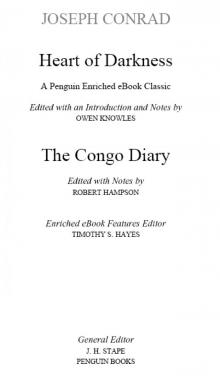 Heart of Darkness and the Congo Diary
Heart of Darkness and the Congo Diary Notes on Life & Letters
Notes on Life & Letters Typhoon (Single Story)
Typhoon (Single Story)